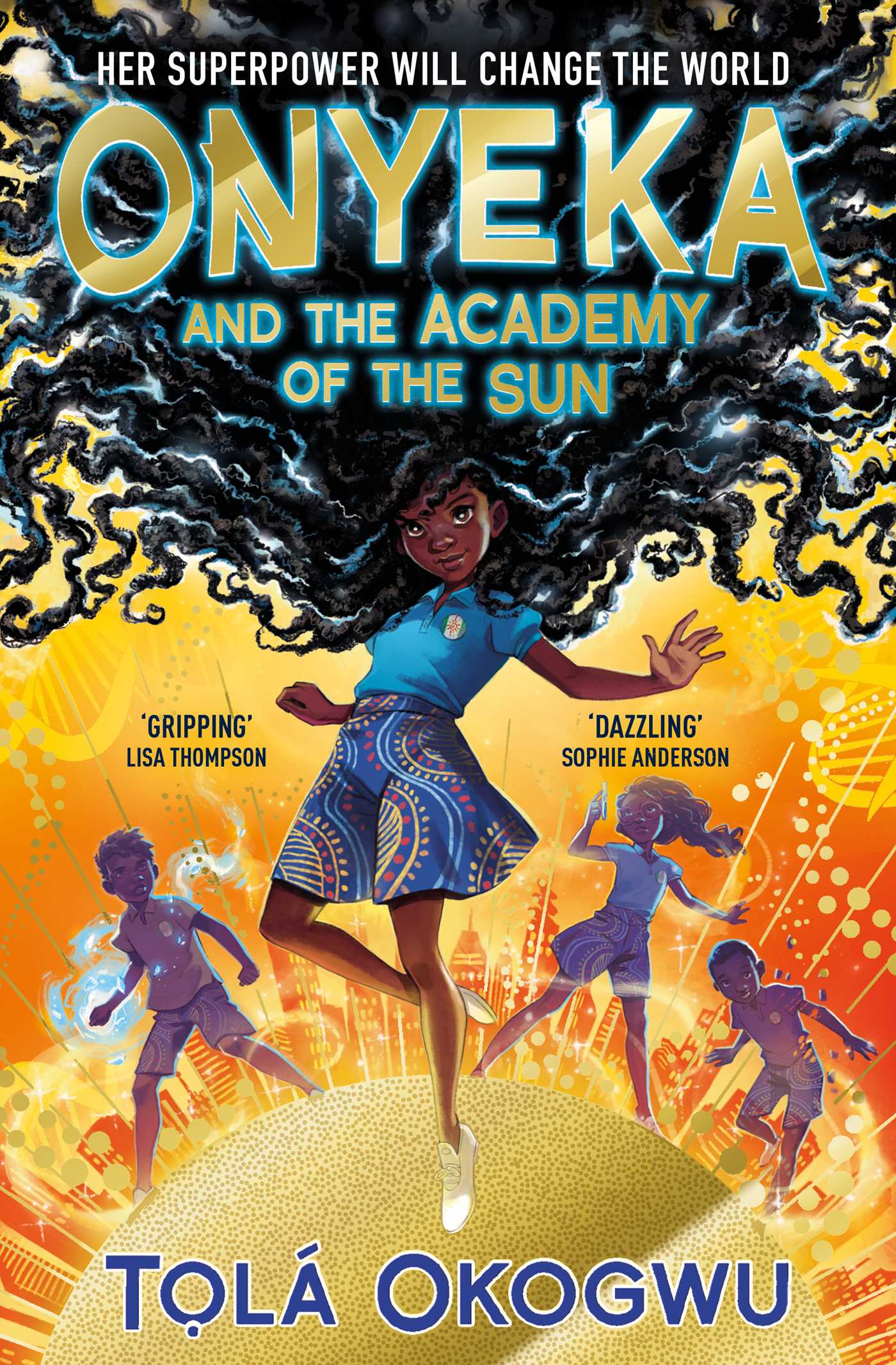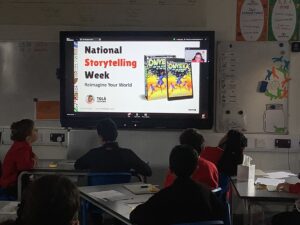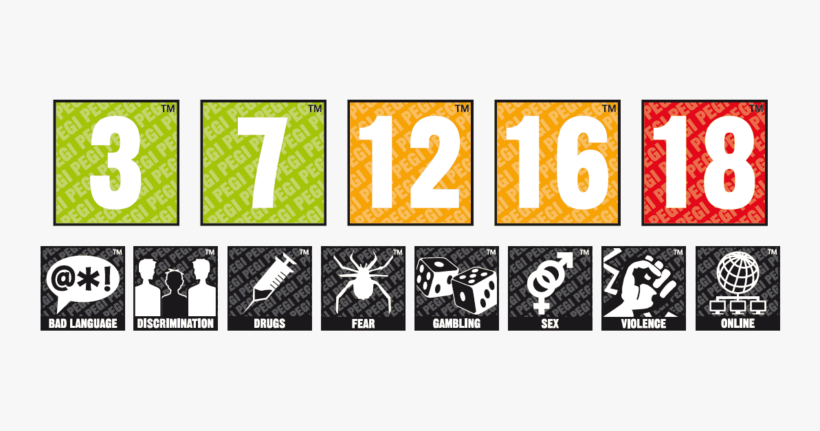Author Zoom with Tola Okogwu!
This week is National Storytelling Week. Year 5 had a zoom with the author Tola Okogwu, who has written written Onyeka, among 15 other books!


Tola talked through her step-by-step guide on how to create ideas for stories. In today’s webinar, we built an origin story for a person with super powers. The three main ingredients we needed for this was the person, the place and the problem.
Here are some of the creative ideas Year 5 came up with:
- a boy with the power of moon and sun (night vision and fire)
- people with telekinesis
- a girl with super speed
- a boy who could shrink into different sizes
- a girl with extremely long hair
- a boy who can control time
- a boy with a super jump
- a girl who can camouflage
- a boy who is super strong
Help at home: Encourage your child to write their story using their ideas from today.
Living and Learning: Internet safety
Today, Year 5 were joined by D:side Dave! He was here to talk to us about online safety. To start off our session, he asked the children to guess how old each social media site would be. To start off, we had lots of guesses around 40 years old but quickly realised social media was not that old at all!



We looked at a case study: ‘Alfie is 10 years old. He has just got a phone for his birthday and has opened an Instagram account. He has 450 followers.’
Year 5 discussed how 450 was too many followers as he does not know that many people. Grace said, ‘You should NOT accept people you don’t know!’
‘Alfie has now changed his profile to a private profile.’
The children spoke about how a private profile is a good idea! This means only people you accept can see your profile.
‘Alfie has told his parents his password.’
A sensible choice is to set a password and tell parents just in case they need to use it but not everyone does this. Some Year 5 children have said they will now tell their parents their passwords for their safety!
We ended off our session trying to see how good we were at deciding if an online account was real or fake. Parents, can you tell which account is the real one and which three are fake?

Help at home: Have a discussion with your child about three ways we can be safe with an online social media account.
National Storytelling Week

It’s national storytelling week! Y6 were pleased to join a webinar hosted by author Tola Okogwu. She’s written Onyeka, among lots of others, and took us through how she comes up with her amazing story ideas.

We could interact with Tola and she even picked Luca’s idea of the character having super stretchy legs as her super power! Check it out below.

We loved thinking creatively to start off this magical tale so help at home by finishing it off or starting a new one with your own ideas!
Living & Learning: online safety
Today, Year 4 were lucky to have a workshop from D:Side all about staying safe online – particularly when playing online games.
Not everything we see online is trustworthy and your children were great at identifying that! We discussed how not everyone online is who they say they are so we must always speak to a trusted adult if we are unsure or feel unsafe online.
Although the internet is great for many things, we must make sure we are using it safely. For example, your children love playing lots of online games (which can be great fun) but sometimes they also introduce some risks. That is why they have age restrictions based on what content is included in the games.

In Year 4, we should only be playing games that are rated ages 3 or 7. This is because they have content that is appropriate for our age.
We were all really impressed with your children’s knowledge of how to stay safe online. It was great to hear all their contributions for how we can also make sure we’re being safe and responsible online.
Help at home: check the age ratings of your child’s favourite games to play online. Are they appropriate for them to play?
Living and Learning: Internet Safety and age restrictions
Year 3 had a visitor this morning from D:Side. We were learning about being safe online while playing on different games.
Lots of us enjoy playing games online and they can be really fun but there is also lots of things we need to be careful around.
Lots of games have age ratings and restrictions based on the content they show. In Year 3, we should only be playing games that are rated ages 3 or 7. This is because they have content that are appropriate for our age.
There are also many people online that we may interact with. Not everyone online is who they say they are so we must always ask a trusted adult if we are unsure or feel unsafe online. 
Even if someone says they’re 7, that they love reading and have a pet dog, they might not be telling the truth! We had a go at deciphering and deciding whether the friend requests were safe or not.
Help at home by checking the age ratings of your child’s favourite games to play online. Are they appropriate for them to play?
KS2 ice skating Planet Ice
As part of our involvement with Leeds Well Schools Partnership, a group of twelve Key Stage children recently took part in an ice skating session at Planet Ice.
After getting kitted out with our ice skates, we ventured onto the ice with some children being very hesitant. Our instructor taught us how to get up safely if we fell (and there were quite a few falls!), how to move forward on our skates and how to glide. All the children had a great attitude to learning these skills and showed excellent resilience and support to each other. By the end of the session, there was some great progress made and lots more smiles! Well done to all the children who took part.
This event was incredibly popular with over 90 children requesting to take part. If you would like to give ice skating a go, then have a look at the sessions available at Planet Ice. We’d recommend it!










Spring 1: Week 4
This week’s Living and Learning statement is I know how to seek help.
The children have suggested different ways they can do this.
“ I can ask a grown up.”
“If I am in a shop I can ask the shop worker.”
“At lunchtime I can ask a play leader.”
Math
During this week’s maths we have been looking at the composition of 5. The children have been using the 5 little alien’s song to show the different ways that 5 can be made up. We have also been looking at 6 and 7 using the sentence 6 is made of 5 and 1.



Writing
The children are doing a fantastic job at developing their writing skills. They are using their phonic skills to help with spelling and remembering to end a sentence with a full stop.

Help at home: by encouraging your child to form their letters correctly when writing.
PE
The children have been further developing their yoga skills this week by working together to create a sequence of yoga poses.
Reading
The children enjoy visiting our library every week.



Remember: to bring your book back every Thursday and your reading record.
Living and Learning: Being safe
Being safe is a key part of our Living and Learning curriculum.
We took part in the NSPCC Speak out Stay Safe online assembly.


During the assembly, we heard about Sam and some things that were upsetting Sam.

Thankfully, Sam told a teacher about her worries. We thought about which grown-ups would be good to talk to in school and out of school (start telling other people). Brothers, sisters and friends would also be good to talk to and discuss feelings but telling a grown-up (over 18) would be the best thing to do to get help.

Our Living and Learning box, in the classroom, is another way the children can speak out and write down any worries.

We also heard about Childline – ask your child to show you the way to remember the number.
Help at home: Buddy Zone, on the Childline website, has some games and activities for the children to do.

Drop Down Morning
Today, we have had a topic drop down morning. In these mornings, we recap previous learning; this time, we recapped Geography (volcanoes), Computing (Scratch) and History (Carnivals and the Atlantic Slave Trade).
In our Geography learning, Year 5 looked at the relationship between the location of volcanoes and the location of tectonic plate borders.


They then had to label the different pictures which related to volcanoes and add any extra facts they could remember.


In our Computing lesson, the children had to identify the key vocabulary from the definitions and pictures. We also discussed computer over use and spotted signs from our body and environment that showed us we need to take a break from screens.


To finish the session, Year 5 could spend some time on scratch, revisiting their learning from Year 3 and 4.
In our History session, we matched out key vocabulary to their definitions. We then went on to discuss what a carnival was and recalled who started the Leeds West Indian Carnival: Arthur France. Arthur France immigrated to England at the age of 21.
As well as being a celebration of West Indian culture, the carnival is a celebration of the end of slavery. We looked at what the Atlantic Slave Trade was.
In the 16th Century, Britain had started new settlements (called colonies) in the West Indies and North America. The British needed lots of people to work on the huge sugar, cotton and tobacco farms (plantations) there.
Britain used slaves taken from Africa to do this work. This forced movement of slaves from Africa to the West Indies and America was called the Atlantic Slave Trade.

Help at home: Ask your child how they worked as a geographer, computer programmer or historian today.
Reminder: stay and learn session
Fine Motor Skills and coffee morning – 03.02.25 9-10am



